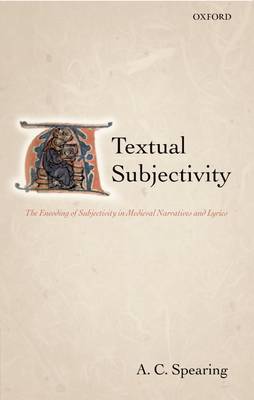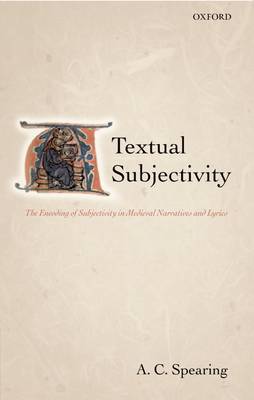
- Afhalen na 1 uur in een winkel met voorraad
- Gratis thuislevering in België vanaf € 30
- Ruim aanbod met 7 miljoen producten
- Afhalen na 1 uur in een winkel met voorraad
- Gratis thuislevering in België vanaf € 30
- Ruim aanbod met 7 miljoen producten
Zoeken
Textual Subjectivity
The Encoding of Subjectivity in Medieval Narratives and Lyrics
A C Spearing
Hardcover | Engels
€ 402,95
+ 805 punten
Omschrijving
This book investigates how subjectivity is encoded in the texts of a wide variety of medieval narratives and lyrics--not how they express the subjectivity of individuals, but how subjectivity, escaping the bounds of individuality, is incorporated in the linguistic fabric of their texts. Most of the poems discussed are in English, and the book includes analyses of Chaucer's Troilus and Criseyde, Man of Law's Tale, and Complaint Unto Pity, the works of the Pearl poet, Havelok the Dane, the lyric sequence attributed to Charles of Orleans (the earliest such sequence in English), and many anonymous poems. It also devotes sections to Ovid's Heroides and to poems by the troubadour Bernart de Ventadorn. For the first time, it brings to bear on medieval narratives and lyrics a body of theory which denies the supposed necessity for literary texts to have narrators or "speakers," and in doing so reveals the implausibilities into which a dogmatic assumption of this necessity has led much of the last century's criticism.
Specificaties
Betrokkenen
- Auteur(s):
- Uitgeverij:
Inhoud
- Aantal bladzijden:
- 282
- Taal:
- Engels
Eigenschappen
- Productcode (EAN):
- 9780198187240
- Verschijningsdatum:
- 29/12/2005
- Uitvoering:
- Hardcover
- Formaat:
- Genaaid
- Afmetingen:
- 140 mm x 216 mm
- Gewicht:
- 503 g

Alleen bij Standaard Boekhandel
+ 805 punten op je klantenkaart van Standaard Boekhandel
Beoordelingen
We publiceren alleen reviews die voldoen aan de voorwaarden voor reviews. Bekijk onze voorwaarden voor reviews.








